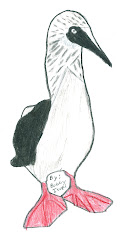The more I read, the more questions I have!
I have read that the blue-footed boobies travel to most of the islands north and south of Ecuador, but they don't know if they migrate further than that distance. They usually live in very large colonies so there are always some of them nesting (in pairs). Do you know if they stay with their mate for life?
When you stay there, will you stay at the Darwin settlement or in one of the hotels for tourists?
I read that there are only 54 sites open for tourism and that they recommend people take cruises to see more of the islands. Will you be taking a cruise during your time? Are people allowed to go in the water (diving, snorkeling) on their own or only as part of organized tours?
How do they protect the islands? Do they have island security? Do they have water security (like our Coast Guard)? Who pays for it - donations or government funding?
Where do the settlement employees get emergency care if needed? Are they transported by boats or helicopters?
Are their illnesses that you can be exposed to from all of the animals and birds? Did you have to get special immunizations? Are the animals at risk from any particular human diseases?
Mike C's mom, (pd 8)
Mrs. C.,
Excellent questions, and thanks for joining us! Moms are welcome also!
First, thanks for the booby migration information. Many species in the Sulidae family pair for life.
I will be staying in hotels while on the islands. We do need to travel to a few of the islands, and we will do that by boat. I am not sure if people can snorkel or scuba dive on their own; it may depend on the island. But don't quote me on that! I hope to dive while on the trip. If it is possible, I would go through a dive shop.
I did not need to get immunizations for the trip, however, I've already have several from my trip to Africa last summer.
Hey, Mike, how about you helping out with the rest of the answers to your mom's questions?!
Thursday, September 27, 2007
A typical September day
I was wondering exactly how hot it gets down in the Galapagos. I think it's odd how you said that penguins can live there. I'm just curious what the average temperature is on the islands on a typical September or October day. Also, does it ever get cold in the winter since it's right along the equator?
Allie, pd. 9
Allie, it does seem very odd that there are penguins around the Galapagos Islands. This is because of the Humboldt Current (read Cara's entry "Not typically tropical" dated September 19th). I just looked up the ten-day forecast on weather.com for the Galapagos. The temperature will be in the low 70s every day. We'll have to do some research to find out what the temperature is year round, or maybe I can just take another trip to the islands in the winter!
Allie, pd. 9
Allie, it does seem very odd that there are penguins around the Galapagos Islands. This is because of the Humboldt Current (read Cara's entry "Not typically tropical" dated September 19th). I just looked up the ten-day forecast on weather.com for the Galapagos. The temperature will be in the low 70s every day. We'll have to do some research to find out what the temperature is year round, or maybe I can just take another trip to the islands in the winter!
"Stupid Fellow"
In class you mentioned that the blue footed booby had a Spanish connection to how it got its name. Well I looked it up on http://en.wikipedia.org/wiki/Blue-footed_Booby and found the answer. It says that the blue-footed booby got its name from the Spanish word Bobo. Bobo means in Spanish “stupid fellow”. It also says that they were very clumsy on land, but also can be very tame. That is kind of weird. It also mentions that it is part of the Sulidae family which comprises ten species of long-winged seabirds. Now that is interesting.
Bobby, pd. 8
Gracias, Bobby! Now you know where the phrase, "don't be a booby" comes from!
Bobby, pd. 8
Gracias, Bobby! Now you know where the phrase, "don't be a booby" comes from!
Subscribe to:
Comments (Atom)


